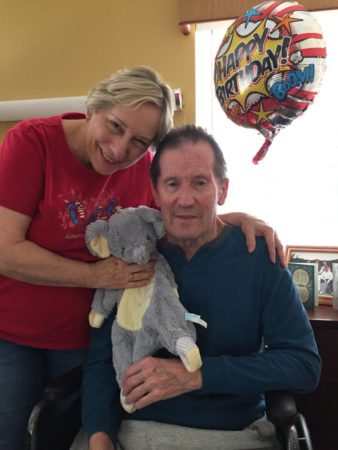Single mom, Julie Annette Bennett, met a single dad who melted her heart. She became a giddy girl as they fell in love and married in 1991. They each had a son from their first marriages. After their initial 16 years of “marital bliss” including rebellious coming-of-age sons, Julie’s commitment and love for Scott would be tested in unimaginable ways.
First, her husband had a heart condition that required a transplant. Time was running out, and the doctors at the University of California San Francisco (UCSF) disagreed. In 2007, she writes, the cost of a heart transplant was $1,000,000. Will insurance cover the life-saving operation? Uncertainties unfold. And then there’s the aspergillus pneumonia that threatened his heart. He was careful. Where did he catch this fungal infection? From 2007 to 2019, she cared for him through the highs and lows until his passing with Alzheimer’s.
If you think serving as the President of the United States for four to eight years is challenging, try being a loving caregiver for a dozen years while your husband navigates three life-threatening health events, including a heart transplant and Alzheimer’s!
The Phoenix Man is organized in two parts. The first includes Bennett’s real-time email updates with her family and friends as they navigate the day-to-day uncertainties of Scott’s fragile heart condition. She sees these correspondences as a way to release her stress and share her joys while caregiving. She finds her friends’ and sons’ reactions comforting.
Sprinkled among the daily life-and-death struggles and challenges with medical personnel, are nuggets of humor and awe. After the transplant surgery was performed in San Francisco, Janice, Julia’s longtime and maybe best friend, observed that Scott could sing, “I left my heart in San Francisco.” Good one, Janice! Second, the cost of after-care and onset of aspergillus pneumonia and more ran closer to $3,000,000!
By 2011, Julie realized they needed to switch insurers as their premiums and co-pays were depleting their meager financial resources. When she went to her new doctor regarding her own health issues with insomnia, anxiety, and dizziness, tests were inconclusive. Her doctor insisted her symptoms were in her head (“mental issues”) and prescribed more medications. She became worse.
With strong support of her friends and sons, she rested and regained control over her own health as her husband slid into his final and terminal illness—Alzheimer’s.

If Scott’s tenuous heart condition was not overwhelming enough for his caregiver wife, Julia encounters even greater unexpected adventures that she shares in the second half of The Phoenix Man.
First, there was a move out of their two-story home as climbing stairs was difficult for Scott. They couldn’t find a home to buy, after their home sold, so they moved into an apartment. Once they did find an ideal home, fires threatened their area and they had to evacuate. This was proving quote stressful and disorienting for Scott. Eventually, she moved him into a care facility.
I was intrigued reading this inspiring book, published two decades after I wrote the first edition of my own caregiving journey for my father with Alzheimer’s. I too found humor as I cared for my father. Laughing made life easier for us. Each caregiver’s road is different. I did not deal with nearly as many life-and-death challenges as Julie Bennett. I wondered if I could have survived all that she did.
She writes about hospice, removing most of his medications, the pain of Scott’s outbursts and not recognizing her despite her daily and sometimes twice daily visits. She hates Alzheimer’s as many of us do. Early on, she wrote about how her husband needed sleep to recover yet the medical team members would come in every few hours to do one thing or another and disturbing his restful slumber. And after his last breath, she writes, “Grief… you can’t just hold it awhile and let it go. No… you have to stare grief in the face and feel its fury until it dissipates, rolling away like a wave only to come back harder and stronger the next time. Each wave takes more of you, leaving pain and sadness in its wake.” She also writes how she’s managed to cope and provides five tips for caregivers.
Each short chapter is a page-turner in this nearly 300-page book, concluding with a boxed message for caregivers.
The Phoenix Man inspires caregivers page after page by illuminating the lives of two people trying to survive unjustifiable obstacles each day. Meanwhile, caregiver Julie learns how to better communicate with a person with dementia and also take time to care for herself. She and Scott may have lacked finances but they were wealthy with dedicated and caring friends and sons. The Phoenix Man inspires caregivers through Scott’s sheer determination to survive and his wife’s commitment to honor his wishes and to serve beside the man she loves.









Pingback: Caregiver Enables The Phoenix Man to Rise Again…and… - The Phoenix Man
Hi Brenda,
What a surprise to find this article this morning when I went on Twitter. Thank you for writing such a beautiful synopsis of Scott’s and my book, The Phoenix Man. It made my day!!!
Julie Annette Bennett
You are welcome, Julie.
Your caregiving experience with Scott is truly an inspiration!
Thank you for writing and sharing it.
Brenda